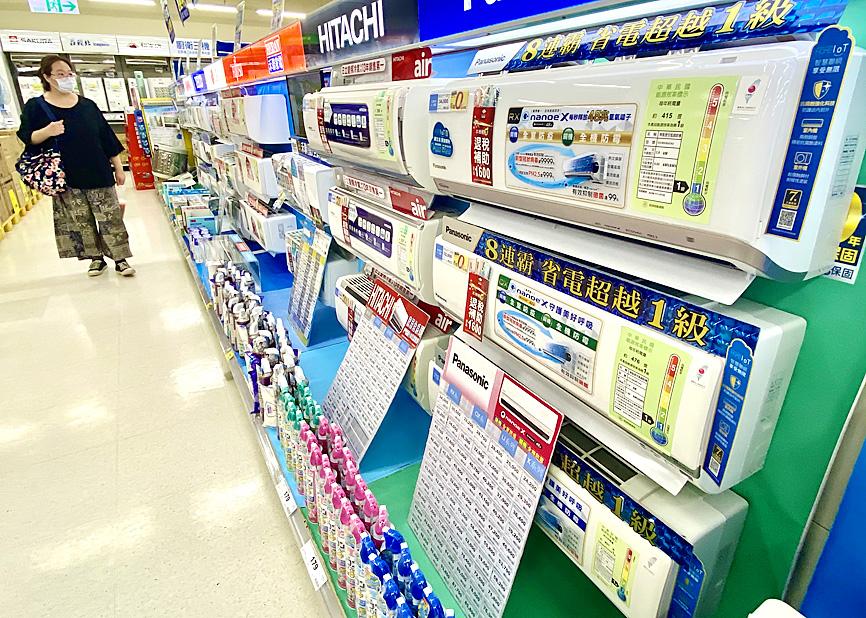Peak electricity consumption nationwide yesterday surged to a record 40.74 gigawatts (GW) amid high temperatures and robust manufacturing activity, surpassing Taiwan Power Co’s (Taipower, 台電) 40GW threshold for a third day.
The peak power consumption pushed Taipower’s operating reserve to as low as 10.3 percent, nearing its “yellow” range of 6 to 10 percent, which raised concern about tight power supply and potential rationing.
The yellow designation means that the electricity supply is under constraint, the state-run utility company said.

Photo: CNA
Yesterday’s peak consumption surpassed its estimates of a peak of 39.7GW and 40.64GW for this year and next year.
As high temperatures are set to continue over the next few days, Taipower said it expects peak power consumption to remain high next week.
The company raised its forecast of peak power consumption for next week to 41GW, Taipower spokesman Wu Chin-chung (吳進忠) told the Taipei Times.
“The peak power consumption might surpass today’s level next week,” Wu said. “With more sources of solar power to be connected to the grid, we expect operating reserves largely to remain at a healthy level of more than 10 percent next week.”
Taipower’s latest forecast shows that operating reserves could drop to 8.63 percent tomorrow, 9.05 percent on Monday and 9.82 percent on Tuesday.
Aside from rising demand for electricity, a reduction in power generation from local cogeneration companies is also attributing to lower operating reserves, Wu said.
Cogeneration companies idled some power generation facilities due to soaring global fuel prices, he said.
The nation’s power usage is expected to expand 2.3 percent annually from this year to 2028, due to strong economic growth and a flourishing manufacturing sector, the Bureau of Energy said in a report.
Peak power consumption is to climb 2.5 percent year-on-year, the bureau forecast.
That represented a significant rise, compared with annual growth of 1.6 percent from 2012 to last year, the report said.
As more manufacturers bring their Chinese production back to Taiwan to cope with geopolitical tension, electricity consumption is rising, the bureau said.
Last year, power consumption rose 4.5 percent year-on-year, it said.
The report showed that energy from renewable sources would make up about 15.1 percent of total power generated by Taipower and private power generators in 2025, falling short of the 20 percent target set by the government.

CHAOS: Iranians took to the streets playing celebratory music after reports of Khamenei’s death on Saturday, while mourners also gathered in Tehran yesterday Iranian Supreme Leader Ayatollah Ali Khamenei was killed in a major attack on Iran launched by Israel and the US, throwing the future of the Islamic republic into doubt and raising the risk of regional instability. Iranian state television and the state-run IRNA news agency announced the 86-year-old’s death early yesterday. US President Donald Trump said it gave Iranians their “greatest chance” to “take back” their country. The announcements came after a joint US and Israeli aerial bombardment that targeted Iranian military and governmental sites. Trump said the “heavy and pinpoint bombing” would continue through the week or as long

TRUST: The KMT said it respected the US’ timing and considerations, and hoped it would continue to honor its commitments to helping Taiwan bolster its defenses and deterrence US President Donald Trump is delaying a multibillion-dollar arms sale to Taiwan to ensure his visit to Beijing is successful, a New York Times report said. The weapons sales package has stalled in the US Department of State, the report said, citing US officials it did not identify. The White House has told agencies not to push forward ahead of Trump’s meeting with Chinese President Xi Jinping (習近平), it said. The two last month held a phone call to discuss trade and geopolitical flashpoints ahead of the summit. Xi raised the Taiwan issue and urged the US to handle arms sales to

BIG SPENDERS: Foreign investors bought the most Taiwan equities since 2005, signaling confidence that an AI boom would continue to benefit chipmakers Taiwan Semiconductor Manufacturing Co’s (TSMC, 台積電) market capitalization swelled to US$2 trillion for the first time following a 4.25 percent rally in its American depositary receipts (ADR) overnight, putting the world’s biggest contract chipmaker sixth on the list of the world’s biggest companies by market capitalization, just behind Amazon.com Inc. The site CompaniesMarketcap.com ranked TSMC ahead of Saudi Aramco and Meta Platforms Inc. The Taiwanese company’s ADRs on Tuesday surged to US$385.75 on the New York Stock Exchange, as strong demand for artificial intelligence (AI) applications led to chip supply constraints and boost revenue growth to record-breaking levels. Each TSMC ADR represents

State-run CPC Corp, Taiwan (CPC, 台灣中油) yesterday said that it had confirmed on Saturday night with its liquefied natural gas (LNG) and crude oil suppliers that shipments are proceeding as scheduled and that domestic supplies remain unaffected. The CPC yesterday announced the gasoline and diesel prices will rise by NT$0.2 and NT$0.4 per liter, respectively, starting Monday, citing Middle East tensions and blizzards in the eastern United States. CPC also iterated it has been reducing the proportion of crude oil imports from the Middle East and diversifying its supply sources in the past few years in response to geopolitical risks, expanding